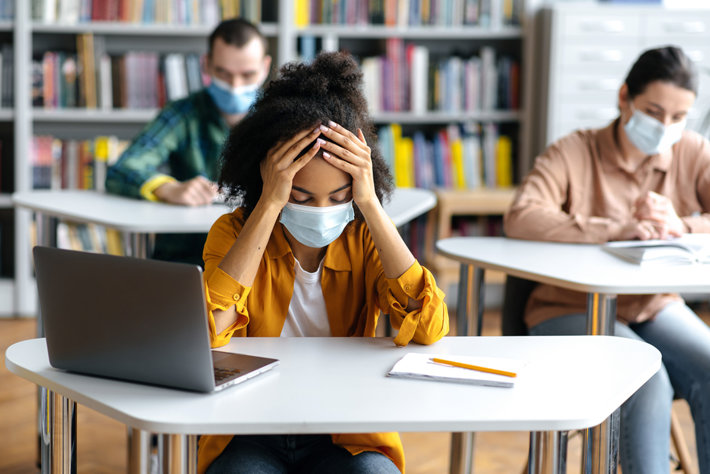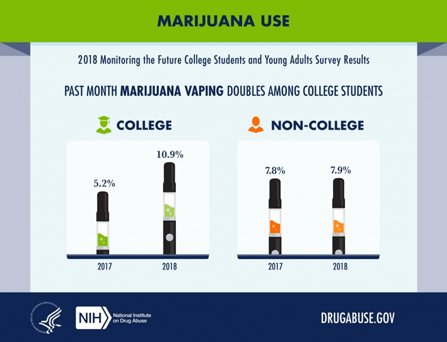A Look at College Campus Drinking and Drug Use

The issue of college students drinking alcohol and using drugs is a relatively well-understood phenomenon. It’s received a fair amount of study and attention over the years thanks to individual colleges’ efforts to solve the problem. But what does this problem look like now with the added risk factors of the COVID-19 pandemic and at least three semesters of no in-person classes are added in? Are college students more likely to misuse drugs and alcohol than they were before the pandemic? Is the situation worse now? Parents and educators alike must understand the new risks of college students experimenting with drugs and alcohol in order to ensure the safety of young adults attending university courses.
Laying Out the Problem
After no in-person college classes for well over a year, American college students are finally going back to in-person universities. Given that the COVID-19 pandemic is still ongoing and given that colleges have sometimes been the location of first-time drug and alcohol abuse for young adults, a few factors must be considered:
1). College has been remote for many students for a year and a half, and this fall semester probably will be the first in-person semester since before the pandemic. The pandemic will have likely created additional stressors and challenges that are now being faced on campus.
2). Given the recent hectic and stressful time caused by the pandemic and with many young students just now coming into college after graduating high school during a pandemic, it’s likely the “college experience” will be very different for freshmen now than it was for freshmen two years ago.

3). Given these factors, parents, students and campus faculty need to focus even more on prevention, student resources, education about drugs and alcohol, and treatment for substance abuse when drug abuse does occur.
Understanding the Crisis; Pre-COVID Information on College Drinking and Drug Use
The Monitoring the Future Survey, a research program that operates within the National Institute on Drug Abuse, has worked tirelessly to determine the scope of substance abuse among young people. According to the 2018 Monitoring the Future Survey, marijuana use among college students was up 5% from five years prior, with one in seventeen college students reporting daily marijuana use. Furthermore, marijuana vaping doubled among college students in just one year (from 2017 to 2018).

Also according to the Monitoring the Future Survey, approximately 11% of college students misuse Adderall, likely because they’ve been told by drug dealers that the drug will improve their test-taking capabilities.
Turning to alcohol misuse, about 28% of college students report binge drinking, which the National Institute on Alcohol Abuse and Alcoholism defines as, “A pattern of drinking alcohol that brings blood alcohol concentration (BAC) to 0.08 percent – or 0.08 grams of alcohol per deciliter – or higher. For a typical adult, this pattern corresponds to consuming 5 or more drinks (male), or 4 or more drinks (female), in about 2 hours.” College students binge drink alcohol at a higher rate than non-college students, with 28% of college students reporting binge drinking compared to 25% of non-college student adults in the same age bracket.
Preliminary Data on COVID-19 Stress, College Life, and Substance Abuse
There is no doubt that the pandemic added new stressors to college students. In the face of these new stress factors, one can surmise that some students might experiment with drugs and alcohol as a coping mechanism. A paper published in Sage Journals, examined several of these stress factors, some of which are outlined below:
- Uncertainty as a Stressor
- Academic Stressors
- Economic Stressors
- Social Isolation and the Loss of Social Supports
- Social Media & the Stress of Misinformation
- Loss of Opportunity to Cope by Using a Physical Activity
That same paper found that students who were more likely to suffer from any of the above stress factors on-campus were more likely to experiment with substances. Quoting the study, “Early data suggest youth and young adults are more likely to increase their substance use in response to the global pandemic.”
“Early data suggest youth and young adults are more likely to increase their substance use in response to the global pandemic.”
Another study focused on the effects the pandemic might have on substance abuse trends among college student-athletes. The paper described how the added stressors of COVID-19 coupled with a loss of an opportunity to cope using physical activity (due to suspended sports activities for COVID-19 safety reasons) could exacerbate already-present stress factors for college athletes.
On a broader scale, one could surmise that college students in many ways rely on college athletics, sports games, extracurricular groups, and the deeply entwined social environments of colleges to support them through the considerable pressures of maintaining good grades, holding down a job, passing classes, etc. To the degree that such activities and engagements have to be limited or removed entirely to prevent the spread of COVID-19, students may struggle without those social safety nets. They may turn to substance abuse as an alternative coping mechanism.
Case in point, one article found that marijuana use among college students hit record highs in 2020, with 44% of college students reporting marijuana use, an even higher percentage than non-college adults in the same age bracket. And that’s quite shocking because prior to 2020, non-college adults in the same age bracket as college students had historically always reported higher levels of marijuana consumption than college students.
There is Always a Serious Risk; When College Students Die from Drug Use and Alcohol Misuse
Drinking and drug use always comes with serious risk, and college students do sadly sometimes lose their lives from such activities. That’s why addressing this issue is so important. A cursory search for headlines related to on-campus deaths will provide a list of substance abuse-related deaths among college students such as the several drug-related deaths on the USC campus in 2019 and an overdose death at the University of Denver in that same year.
Alcohol-related deaths among college students are even more common. According to the National Institute on Alcohol Abuse and Alcoholism, about 1,500 college students die each year from alcohol-related causes.
The Importance of Talking to College Students About Drugs and Alcohol

Parents should always do their best to prepare their children for college. Drug and alcohol abuse was a problem on college campuses before the pandemic, and all the data points in the direction of drug and alcohol abuse being even more problematic during and after the pandemic.
Parents need to talk to their children about drugs and alcohol before their kids go off to college and ensure their children understand the truth about drugs and alcohol and all of the reasons why they would not want to experiment with mind-altering substances. Furthermore, parents need to work with the colleges themselves to ensure campuses are organized to effectively balance student safety, educational outcome, social interaction, physical health, and emotional needs.
Addiction Treatment; Helping College Students Get Off Drugs and Alcohol
If prevention efforts are taken and a student still falls prey to drug abuse or alcohol misuse while at college, the immediate solution is to help them enter a qualified, residential drug and alcohol addiction treatment center as soon as possible. If you know someone who went to college and started misusing drugs and alcohol, don’t wait another day to get them help.
Please get in touch with a drug and alcohol treatment center today and ensure your loved one gets help and overcomes their substance abuse problem. Once they’re off of drugs and alcohol, they can get back to school and pursue the rewarding adventure of a college education and the incredible new opportunities such an education offers.
Sources:
- https://www.drugabuse.gov/drug-topics/trends-statistics/infographics/drug-alcohol-use-in-college-age-adults-in-2018
- https://www.niaaa.nih.gov/alcohol-health/overview-alcohol-consumption/moderate-binge-drinking#
- https://journals.sagepub.com/doi/full/10.1177/21676968211014080
- https://covid19.ssri.psu.edu/articles/student-athlete-substance-use-during-covid-19
- https://chicago.suntimes.com/cannabis/2021/9/9/22664701/marijuana-college-students-record-high-covid-pandemic-national-institute-drug-abuse-alcohol-smoking
- https://www.latimes.com/california/story/2019-11-14/usc-student-deaths-possibly-tied-to-drug-overdoses-highlighting-growing-issue-on-campuses
- https://www.usatoday.com/story/opinion/2019/08/20/my-son-fatally-overdosed-schools-must-stop-similar-tragedies-column/2022845001/
- https://www.niaaa.nih.gov/publications/brochures-and-fact-sheets/college-drinking


 ®
®